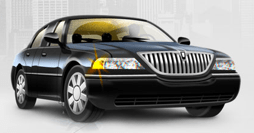Uber began testing in Chicago a month ago, but today the startup is officially launching its disruptive service and fleet of black cars in the Windy City.
In case you aren’t familiar with Uber, the service allows you to order a black car to come to your location via an Android or iOS app. You can actually track your car as it comes to your location as the app tracks the car via GPS. Payments are handled automatically by charging the card you have on file (no swiping necessary and gratuity is includes), and it costs at least 50% more than a taxi. The service has a loyal following in San Francisco, and debuted in New York and Seattle recently.
Uber’s Chicago model is very similar to that of San Francisco and other cities. The service is providing access to a number of different types of vehicles, including Lincoln Town Cars, Escalade SUV’s and Mercedes S550 sedans (I actually rode in one of these luxury Ubers last night). Typical wait times range between three and ten minutes and pricing is less than 1.75 times a taxi’s fare. For basis of comparison, Uber pricing in San Francisco is around 1.6 times the average fare and 1.75 times the fare in New York City.
CEO and co-founder Travis Kalanick tells me that he believes Chicago can be the highest growth market for the car service. Because of the nightlife, the awful weather for seven months of the year, and the large number of sports arenas in the city; demand for Uber could be great. Kalanick may be right. For anyone who hasn’t lived in Chicago, it can be impossible to find a cab when the weather drops below 30 degrees and the wind chill is in full effect (and that happens a lot and for multiple months). And finding cabs around Wrigley Field or Soldier Field after a game or event can also be a trying experience.
Prior to the company’s official launch today, over 1,000 users signed up to use Uber in Chicago.
Kalanick also tells me that in Chicago, there’s much less regulation around black car industry, and drivers who own one or two cars are allowed to exist (as opposed to other cities where there are more restrictions on drivers). Because of this flexibility, Kalanick explains that the integration of Uber with drivers is much more seamless for both parties.
Uber has raised $12.5 million in funding from Benchmark Capital, Founder Collective, First Round Capital, Lowercase Capital and a number of well-known angel investors.
Word on the street is that Uber will be launching in Boston next month and D.C. the following month.
